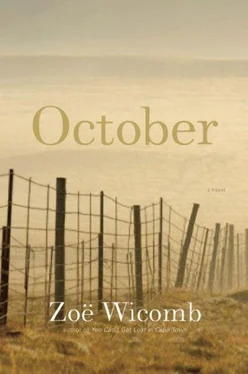In Glasgow Mercia insists on the distinction between living and staying; she is only there temporarily; it cannot be her home. She visits Kliprand often, but knows at the same time that to stay there would allow the soul to die rather than to live. Which is how Mercia and Jake had always thought of the place, although they would have balked at the word soul. The soul of black folk? Or rather, Jake corrected her on an earlier visit — colored folk like them who once adopted soul; nowadays it is better to come clean as colored, he laughed. Typically, he would not expand, could never allow himself to see a thought through, so she exclaimed provocatively, Mayibuye Africa!
Bu-ullshit, he said, turning bull into two syllables.
Nicholas, now dead for several months, had never made a distinction between living and staying. A son of the soil, he called himself, without irony, which was to say a good person. To stay put was virtuous; to stay there was to be alive. Like the great old thorn tree that he planted on his arrival at the gate of the dip-kraal, now rooted in the history of the place, he lived and naturally, necessarily, stayed.
Mercia thinks of her father as still being there. Like the thorn tree. Stricken with guilt, she had come for the five days it took to manage the funeral that Jake and his wife seemed incapable of doing.
I know, her father used to say at the end of each of her visits, I know in my heart that you’ll come back home one day.
Yes, she agreed at first, as soon as this monstrous government is overthrown. After the end of apartheid she had nothing to say, would smile sheepishly at him.
Home to stay! — the opening words of the father in the novel, which strikes a chill in the fictional daughter’s heart, as it does Mercia’s. The chill is laced with guilt. Oh, if only she had spent some time with him before he died.
Bu-ullshit, Jake said, the old bastard was well past his sell-by date.
Ag, Jake, don’t be so disrespectful, so unkind, she pleaded.
Respect! he snorted. I’ve never forgiven him for the beatings. And neither should you.
Was it grief that made Jake speak so cruelly? She was his sister, the one he loved, so why did he seem intent on hurting her? And why did Jake not want her to stay at his house? She saw his wife Sylvie only briefly at the funeral, had not seen the child at all. But Jake shook his head, stared vacantly.
Man, he said, you won’t like our way of doing things. Just count yourself lucky that you don’t stay here, in this mess.
Mercia assumed that he was speaking of the state of the country, of the disappointing aspects of the New South Africa. Perhaps you have unreasonable expectations, she said, given how much of the old South Africa is still in place. But Jake would not be drawn.
I’ll be back soon, she said rashly. I’ll come home for the summer, the winter I mean, so just you get yourselves ready.
There was something unspeakably forlorn about Jake. For all his callous talk about their father, he seemed more distressed than he would admit. Jake needed her, but then, Jake had always needed her, Mercia thought guiltily.
Whatever, he said.
So, fashionable expressions nowadays spread even to unlikely places like Kliprand, a place she thinks of as the bundus or whatever the contemporary word for such places might be. At least Jake did not say Bu-ullshit. Which she hated.
For Mercia there could be no return to the pays natal where the same old dabikwa trees lean to the west and ghanna bush turns gray and crumbles in midsummer. Jake too had gone to Cape Town for good, except that he succumbed to drink. Mercia wept as her father told of how he had become a drunken vagrant, found in the Cape Town docks sleeping rough, and racked with pneumonia. Nicholas had fitted the back of the bakkie with foam and an old traveling rug, and fetched Jake from the gutters of the city; he nursed him back to health in the room that the children once shared. Then Mercia wept on Craig’s shoulder, stricken with guilt for not being there for him, her baby brother, abandoned to the city’s cold wet winter. But their father said that Jacques had only himself to blame, that Mercia should not spill any tears over a good-for-nothing. As for the rug, he was sad that after all those years it had fallen apart, a thing to be thrown away. Their mother, Nettie, had bought it when the children were infants, and he did not like throwing Nettie’s things out, but, he tutted, it was soiled after the journey. A disgrace.
Mercia has never minded Jake being Nettie’s favorite. She struggles to summon a memory of their mother, but a flash of blue striped fabric is all she can muster. That, and yes, a cake for Jake’s birthdays, dried fruit and the smell of clove and cinnamon and nutmeg rising from the oven. Is it an actual memory? her own? Or is the smell entwined with that in the novel she is reading, where the house is filled by the mother with fragrant food? Mercia recollects the message of that fragrance: this house has a soul that loves us all, no matter what . She shakes her head. Again, the soul! She ought to have known the memory to be false. It is just as well, if she can’t distinguish between her own history and someone else’s fiction, that she has abandoned the memoir.
With a sabbatical awarded for the autumn semester, Mercia cannot leave for the Cape right away. There are a number of administrative duties to fulfill over the summer, the re-sit examinations to manage, and her monograph has to be advanced in order to finish it by the end of the leave period. Much as she hates not going away over the summer, there is only just enough time to catch her breath. The memoir has been a foolish distraction.
In the past Mercia has rushed off to escape the disappointing weather. Now the gardens in Glasgow compensate for staying put. With the enduring summer light comes wave after wave of bold efflorescence, which anyone would prefer to drought-stricken Namaqualand. Mercia watches over the fading of glorious forget-me-not, the powdery fragrance of lilac, species after species of flowering rhododendron, and the trellises spangled like so many stars with clematis. She awaits the explosion of flamered poppies, the roses that will stay in bloom until the autumn. That is when she ought to be away, in the month of October, when the sadness of retreating light strikes.
At home, in the Southern Hemisphere, with the sun well on its way to the equator it will be warm, at least during the day. How effortlessly the word comes: home, the place she has not lived in for more than twenty-six years. Hot, oppressive, and heavy with the memories of growing up under the eagle eye of the old man, Our Father, Old Who-art-in-heaven, as the seven-year-old Jake mocked irreverently, but whispered all the same. Home, no more than a word, its meaning hollowed out by the termites of time, a shell carrying only a dull ache for the substance of the past. But living in another country, in a crazy era, Mercia is not yet ready for its collapse.
How the Old Ones would have danced around the strange word, home, poured into it their yearning for a break from the mud and wattle and hide shelters of hunter-gatherers who followed their herds, who muttered under the breath their supplications to the moon, who relied on the seasons to assuage the restlessness of the soul by moving on. Even before the word, there would surely have been old women who sucked their gums in despair and dreamt of living as staying, dreamt of seeds taking root in the earth, growing into ripeness, even as a headman announced the decision to decamp. If nowadays ambition cannot accommodate the old notion of home, there has surely always been ambivalence, the impatience for something new, for moving on, across the world, whilst at the same time, at times, feeling the centripetal tug of the earth.
Читать дальше












